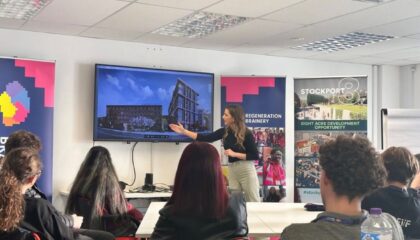How can property owners understand occupiers’ needs? Gathering tenant feedback is increasingly important in a world where landlords are more influenced by the satisfaction of their occupiers than ever before.
Monika Newton, Partner at Workman, asks Louise Freethy, Director and Chief Operating officer at customer experience consultancy RealService, about the value of asking occupiers what they want, and what this can achieve for investors.
- Monika Newton, Partner, Workman
- Louise Freethy, Director and Chief Operating officer at RealService
Monika: Why is it so important for landlords to get tenant feedback at their properties?
Louise: Successful real estate is not just about bricks and mortar – it is also about providing great service to customers. The future of the property industry lies within positioning landlords as property suppliers and occupiers as valued customers. The goal is for property owners to become like the big consumer brands: businesses with whom you’d positively want to do business. And the motive is not altruistic – it’s to drive the 3 R’s of real estate – revenue, retention and reputation. Customer experience and property performance must go hand in hand.
Monika: How can we be sure that our efforts to improve customer experience positively impacts financial performance for investors?
Louise: Danielle Sanderson, an Associate Professor at University College London, harnessed the RealService data from a 10-year period to investigate whether improving customer experience directly lifts the bottom line. She was testing the philosophy that improving customer experience, improves customer loyalty, thereby increasing retention and revenue, because loyal customers want to stay at these properties and continue to pay rent. Danielle also drew on financial data for specific buildings and businesses. Her findings showed that when customer experience improved by one point on the five-point Likhert Scale (excellent, good, average, poor, really poor), there was a 2% uplift in income, over and above what is spent on customer experience.
Monika: What sort of questions should be included?
Louise: No scheme is the same, and the approach to gathering tenant feedback should be bespoke. Questionnaires, compiled in partnership with a client, can cover issues ranging from the provision of amenities and their quality or cleanliness (lifts, reception areas, gardens, parking) to the quality of relationships with building managers, other staff, or landlords (communication, responsiveness, ease of leasing/maintenance processes, likelihood of lease renewal). While questions around current hot topics can be included, it’s best to work with a core set of future-proofed questions, so results and improvements can be compared year on year, while also including relevant additions like, for example questions around Covid response.
Monika: Is it possible to compare tenant feedback across different properties and landlords?
Louise: The Net Promoter Score (NPS) should always be included in questionnaires. This is the question: “On a scale of 0-10, would you recommend us to a friend or colleague?” and its follow-up: “Why / Why not?” The NPS is commonly used by just about every sector outside the property industry and is widely perceived as the leading benchmark for brand loyalty. As such, it is now being taken up by forward-thinking property companies including GPE, formerly known as Great Portland Estates, and the Crown Estate, both of which now publish their NPS.
It’s especially valuable to find out if current occupiers would recommend a particular property, and to be able to compare scores between schemes. Using the NPS, it’s possible for property owners to benchmark themselves within the property sector, but also outside the industry – to compare with the service delivery levels offered by Amazon or Singapore Airlines, for example. Subconsciously, today’s consumers are more and more likely to compare the service levels received across industries.
Data from certain questions also feeds into the RealService Index, which aggregates all responses from all clients over two years. So clients can see where they stand compared to their property industry peers. Of course, a high level of customer satisfaction – especially if this has been evaluated independently – would also be extremely good news for an investor, and this approach provides the investor / operator with a baseline view of all the core occupier experiences.
Monika: Why is it so important to speak to occupiers rather than sending out email surveys?
Louise: Collecting tenant feedback needs to be done in a systematic way, within a customer experience strategy. After a holiday, our founder Howard Morgan was asked to complete a 40-page internet survey which questioned every element of the trip in minute detail. It landed in his inbox the moment he departed and took the gloss off what had been an amazing experience. Participants should not be asked to work so hard: providing feedback should not be an onerous task. It should be simple and engaging and framed in a way that the participant believes their views are valued.
The feedback process should start with a mixture of email surveys and telephone interviews. For a baseline study, we contact at least 20% of the occupiers by phone. This allows everyone the chance to have their say while incorporating a deep-dive approach via phone calls, scheduled at the convenience of the respondent, and facilitated by an experienced interviewer. The five-point Likhert Scale will provide nuance but it’s important to get qualitative information as well as data. Email or text surveys can provide some detail, but a telephone interview or focus group is the best way of asking “why?” or “how can we improve”. The quality of that feedback sets it apart from email surveys, and it has the added benefit of further building the relationship between the occupier and the landlord by opening the dialogue.
Monika: Who should be questioned within the occupier organisation?
Louise: This varies according to the sector and the goal of the occupier research. For retail clients, we talk to those responsible for renting out the space in shopping centres, but we’re also doing site-level interviews where we talk to store managers around footfall, for example. In an office scenario, we might talk to office managers generally around what’s it like to be in the office, the amenities on offer, and we might talk to employees themselves around what it’s like working in that office, for example is there enough bike storage, and are the showers kept clean? Employees are an important audience at the moment. And for ESG issues, which are increasingly being included in our questionnaires, we might talk to sustainability managers. Or to answer questions on service charge levels, and expectations around the future use of space, we would talk to finance directors.
Monika: How should property owners and management teams act upon the results?
Louise: Firstly, don’t be afraid of challenging answers. There’s no point asking questions which only elicit a positive response. Many property owners do this research annually and of course they like to hear the good stuff, but the great ones act very quickly on any areas that need improving. They are monitoring their NPS, they are very actively involved, and their whole business is customer centric. If the results are negative, there are action plans and training that can be put into place, and then hopefully, when they do another survey in 12 months’ time they see that some or all of those issues have been resolved.
Monika: Do some property owners only survey their occupiers as part of a GRESB box-ticking exercise?
Louise: The ESG benchmarking organisation GRESB requires tenant engagement as part of its scoring system. RealService is a GRESB partner, and we helped them pose the right set of questions on occupier feedback. A cynic might say that some property owners only collect occupier feedback in order to collect GRESB points, but we do our best to persuade them that there’s a very strong financial business performance reason for doing it, rather than just ticking a box.
Read more about how we are Building Community across our managed portfolio.






